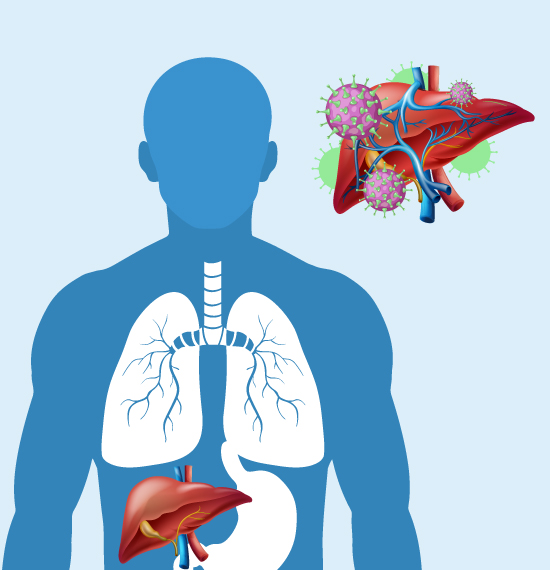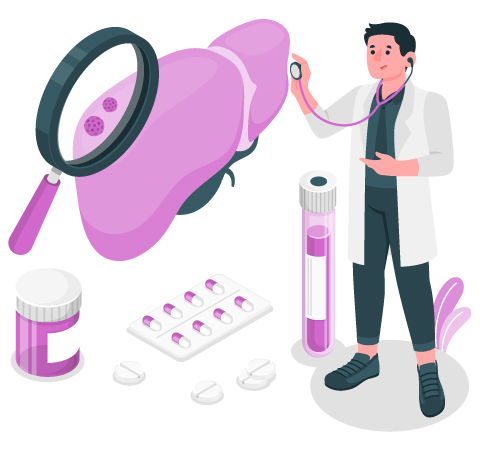Hepatitis B
Hepatitis B is a highly preventable liver disease caused by the hepatitis B virus (HBV). HBV causes the liver to swell and hampers its proper functioning.
Around 95% of adults who come into contact with HBV recover completely within 6 months (acute HBV) without the need for medication. However, approximately 5% of individuals have HBV for their entire lives (chronic HBV), unless they receive successful treatment with medications. Infants born to mothers infected with HBV are at a high risk of developing chronic HBV. Chronic HBV can lead to cirrhosis (scarring) of the liver, liver cancer, and liver failure.

Key Points
- Between 850,000 and 2.2 million people in the United States are living with chronic Hepatitis B infection.
- About 70% of adults with Hepatitis B develop symptoms.
- Information for Those Recently Diagnosed:
- Who is at risk of having hepatitis B?
- Anyone who comes into direct contact with bodily fluids (blood, semen, and vaginal secretions) of a person infected with the hepatitis B virus is at risk.
- You were born to a mother infected with the hepatitis B virus.
- You work or live in a place where you could be exposed to infected blood, such as a healthcare institution or correctional facility.
- You have ever lived with a person infected with chronic hepatitis B virus.
- You have ever engaged in unprotected sex with an infected person.
- You have ever had multiple sexual partners.
- You have ever had a sexually transmitted disease.
- You are a man who has sex with men.
- You share needles or syringes to inject drugs, or share straws to snort drugs (even just once).
- Your blood is filtered by a machine (hemodialysis) because your kidneys aren't working.
What are the symptoms of hepatitis B?
The majority of adults experience symptoms from acute hepatitis B virus infection; however, young children often do not exhibit any symptoms. When symptoms do occur, they may include:
- Fever
- Dark urine
- Joint pain
- Weakness and fatigue
- Loss of appetite
- Nausea and vomiting
- Abdominal pain near the liver
On average, symptoms appear three months after exposure to the virus, but they can manifest anywhere between six weeks and six months. Symptoms typically last for a few weeks, but they can persist for up to six months. Most adults infected with the hepatitis B virus fully recover even if their signs and symptoms are severe.
Some individuals who develop chronic hepatitis B virus experience ongoing symptoms similar to acute hepatitis B virus, but most people with chronic Hepatitis B remain symptom-free for 20 or 30 years.
If you suspect that you have signs or symptoms of Hepatitis B, contact your doctor.
How is hepatitis B diagnosed?
Hepatitis B is diagnosed through blood tests. Various blood tests are available to help your doctor determine whether you:
Could benefit from receiving the hepatitis B virus vaccine
Have an acute or chronic infection
Have recovered from an infection
Are immune to the hepatitis B virus
If you suspect that you have signs or symptoms of the hepatitis B virus, contact your doctor. Blood tests are conducted to check for the presence of hepatitis B virus antibodies in the body. Antibodies are proteins created by the immune system in response to viruses.


How is hepatitis B treated?
Acute
Doctors often recommend bed rest, consuming plenty of fluids, maintaining a healthy diet, and avoiding alcohol. Medications are not typically used to treat acute hepatitis B virus. It is important to regularly visit your doctor to ensure that your body has fully recovered from the virus.
Chronic Hepatitis B Virus
If you have chronic hepatitis B virus, you should undergo regular monitoring for signs of liver disease and the potential need for treatment. Not every person with chronic hepatitis B virus requires medications, and these drugs may cause side effects in some individuals. However, it is important to have regular check-ups with your doctor to monitor your liver disease.
Several medications are approved to treat chronic hepatitis B virus, and many other medications are currently being developed. It is advisable to discuss these options with your doctor to determine the best course of action for you.
Pregnant women should not take hepatitis B virus medications unless recommended by their doctors. Some pregnant women with hepatitis B virus should be treated to prevent transmission of the virus to their babies. Close follow-up with your doctor during pregnancy is crucial to prevent the transmission of Hepatitis B to newborns.
If you have chronic hepatitis B virus, it is important to consult your doctor about treatment options and undergo liver cancer screening every 6 months with an imaging test of the liver and cancer biomarkers in the blood. If you develop cirrhosis, you should inquire with your doctor about the complications associated with cirrhosis. Additionally, discuss with your doctor the possibility of receiving the Hepatitis A vaccine and being tested for Hepatitis C and Hepatitis D (Delta).
How can I prevent getting the hepatitis B virus?
The most effective way to prevent hepatitis B virus infection is by receiving the hepatitis B virus vaccine. The vaccine stimulates the body’s natural immune system to produce antibodies, which are substances found in the blood that protect against the hepatitis B virus. Other measures to reduce the risk of contracting the hepatitis B virus include:
- Using sterile needles and equipment for tattoos or body piercings.
- Using a new latex or polyurethane condom every time you engage in sexual activity if you are unsure of your partner's health status.
- Inquiring with your healthcare provider about receiving the vaccine if you are travelling to a region where the hepatitis B virus is common.
- Seeking help to stop using drugs. If you are unable to quit, use sterile needles and avoid sharing your needles or other drug paraphernalia.
- Refraining from sharing razors, toothbrushes, or other personal items with someone infected with the hepatitis B virus.
Who should receive the hepatitis B vaccine?
Those who should receive the hepatitis B virus vaccine include:
- Newborns
- Children and adolescents who were not vaccinated at birth
- People with chronic liver disease not caused by the hepatitis B virus
- Diabetics under 60 years of age
- People who have undergone or are undergoing hemodialysis, including those with end-stage renal disease on pre-dialysis care, peritoneal dialysis, and home dialysis
- Healthcare and emergency workers, military personnel, morticians, and others at risk of exposure to blood or blood-containing body fluids in their line of work
- Residents and staff of facilities for developmentally disabled individuals
- People working or residing in prisons
- People with a sexually transmitted disease
- People with multiple sexual partners
- Men who have sex with men
- People with HIV
- People who have ever injected or snorted drugs
- Sexual partners and household members of people with the hepatitis B virus
- Travelers or individuals born in countries where the hepatitis B virus is common










